Unit 4 Why don't you talk to your parents? 1A-2D 课件+嵌入音视频(共49张PPT)
文档属性
| 名称 | Unit 4 Why don't you talk to your parents? 1A-2D 课件+嵌入音视频(共49张PPT) | 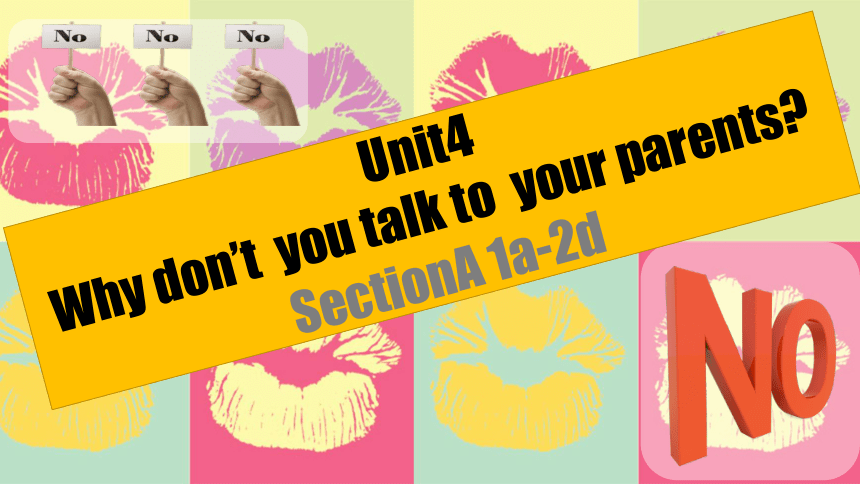 | |
| 格式 | pptx | ||
| 文件大小 | 65.2MB | ||
| 资源类型 | 教案 | ||
| 版本资源 | 人教新目标(Go for it)版 | ||
| 科目 | 英语 | ||
| 更新时间 | 2022-08-25 15:01:09 | ||
图片预览


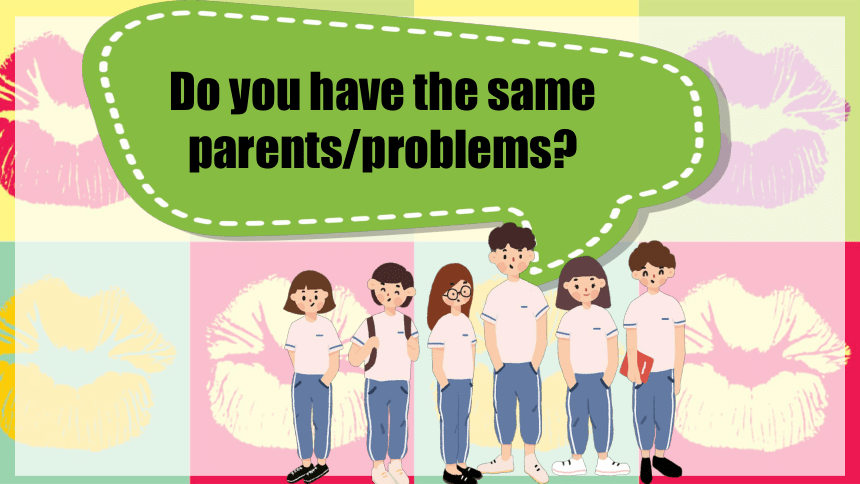
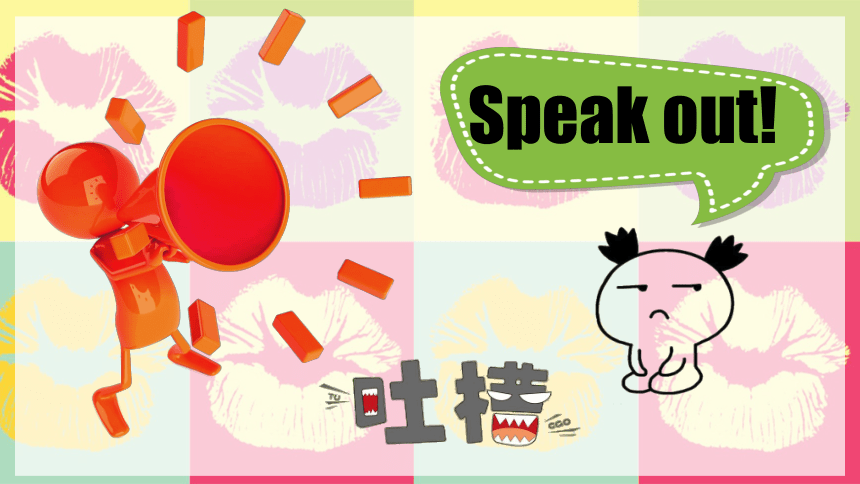
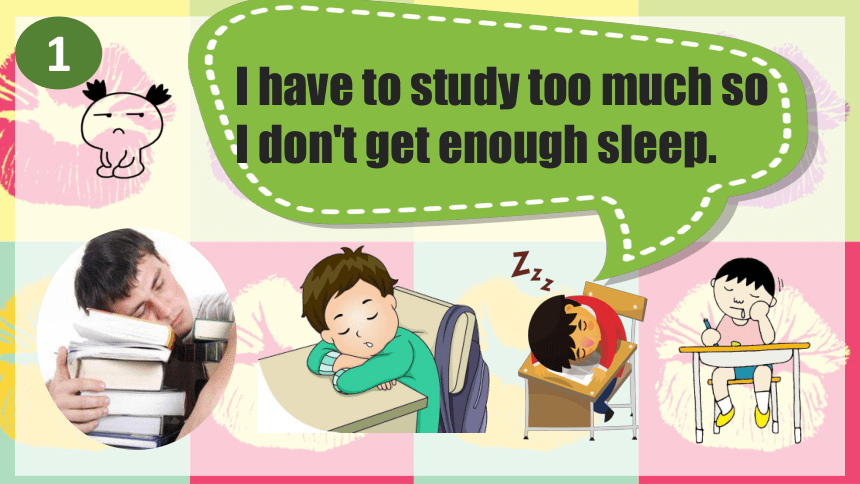
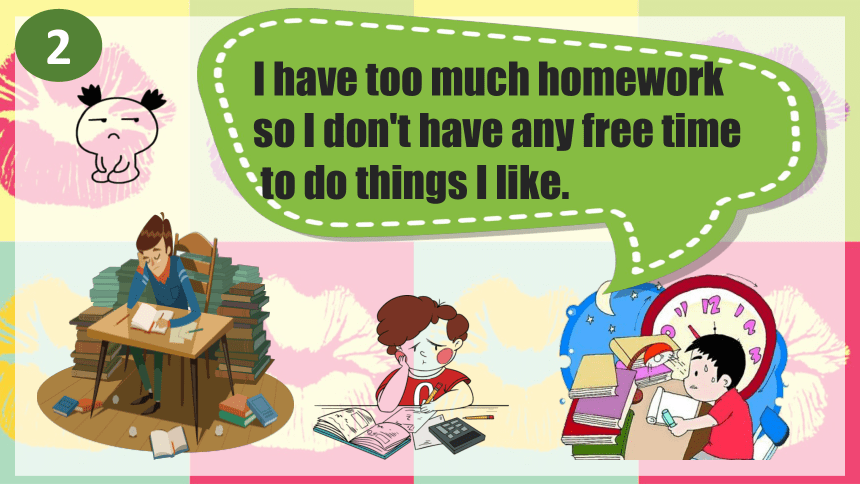
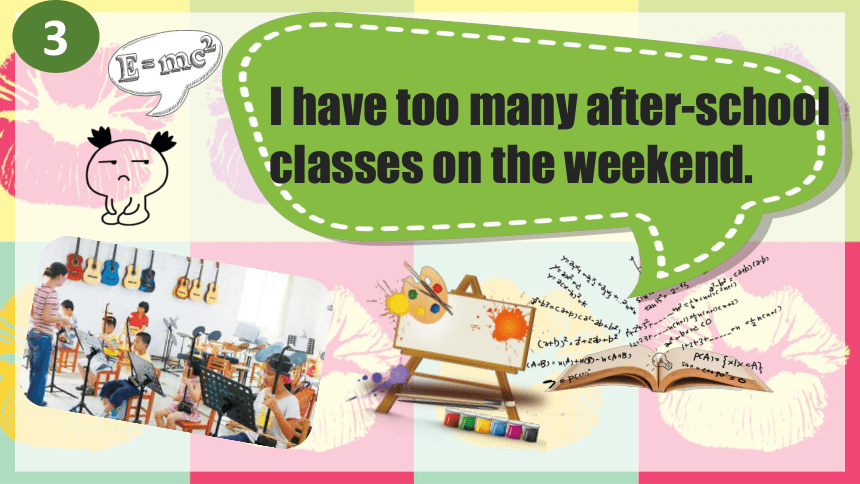
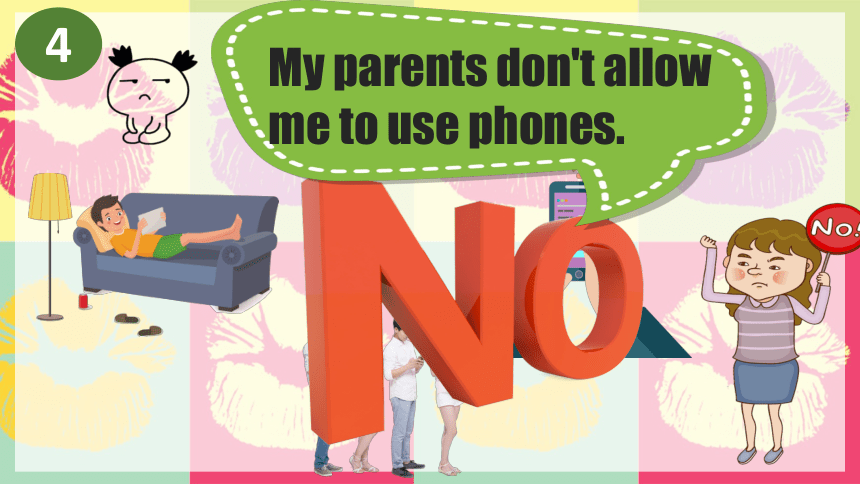
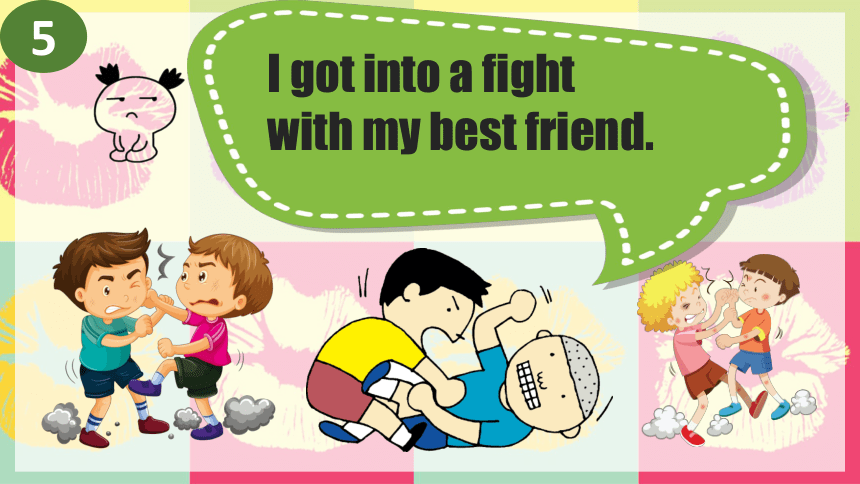

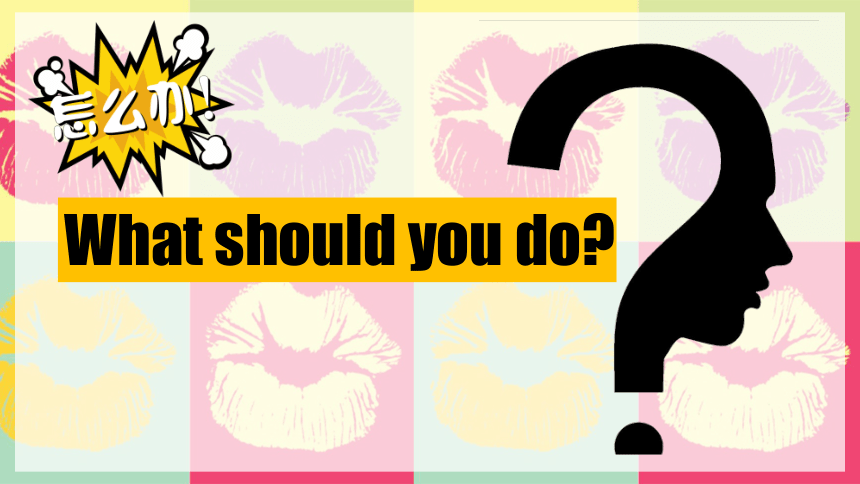
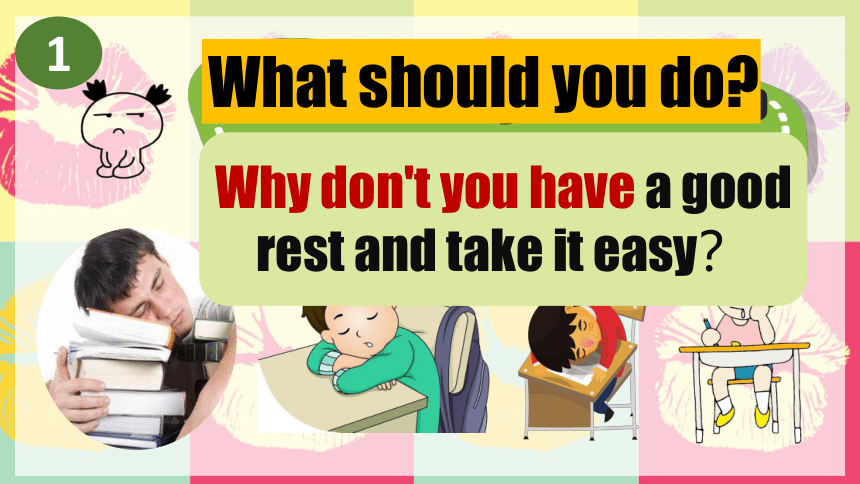
文档简介
(共49张PPT)
Unit4
Why don’t you talk to your parents
SectionA 1a-2d
We want to say something.
Let's watch a video.
Do you have the same parents/problems
Speak out!
1
I have to study too much so I don't get enough sleep.
2
I have too much homework
so I don't have any free time
to do things I like.
3
I have too many after-school
classes on the weekend.
4
My parents don't allow
me to use phones.
5
I got into a fight with my best friend.
63
What should you do
1
I have to study too much so I don't get enough sleep.
What should you do
Why don't you have a good rest and take it easy?
2
I have too much homework
so I don't have any free time
to do things I like.
What should you do
Why don't you talk to your teachers and ask them for help?
3
I have too many after-school
classes on the weekend.
What should you do
Why don't you talk to your parents and tell them what do you want.
4
My parents don't allow
me to use phones.
What should you do
Why don't you hang out with your friends intead of using phones?
5
I got into a fight with my best friend.
What should you do
Why don't you say sorry first
Look at these problems. Do you think they are serious or
not
1a
1. I have to study too much so I don’t get enough sleep.
2. I have too much homework so I don’t have any free time to do things I like.
3. My parents don’t allow me to hang out with my
friends.
4. I have too many after-school classes.
5. I got into a fight with my best friend.
Take it easy.
Everything will be OK!
Some students from a different school have the same problems. Let's listen to the tape and circle the problems you hear in 1a.
I have to study too much so I don't get enough sleep.
My parents don't allow me to use phones.
I have too many after-school classes on the weekend.
What should I do
I have too much homework to do...
Listen and circle the problems you hear in 1a.
1b
1. I have to study too much so I don’t get enough sleep.
2. I have too much homework so I don’t have any free time to do things I like.
3. My parents don’t allow me to hang out with my
friends.
4. I have too many after-school classes.
5. I got into a fight with my best friend.
Girl1: You look really tired. What's the matter
Girl2: I studied until midnight last night so I didn't get enough sleep.
Girl1: Why don't you go to sleep earlie tonight You can start studying
earlier.
Girl2: But I have two after-school classes today. So I can only start
studying after dinner.
Girl1: Maybe you should tell your parents that you can't do so many things.
Girl2: I did, but they think it's important that I take more after-school
classes.
Girl1: Well, they probably want you to get into a good senior high shool.
Girl2: Yes, I guess that's the reason.
Girl1: You should talk to them again. Explain to them that you need to get
enough sleep to stay healthy.
Girl2: That's a good idea. OK, I'll try to talk to them again.
Tapescripts
until 直到......才
注意句子与句子之间
的连词。
Girl1: You look really tired. What's the matter
Girl2: I studied until midnight last night so I didn't get enough sleep.
Girl1: Why don't you go to sleep earlie tonight You can start studying
earlier.
Girl2: But I have two after-school classes today. So I can only start
studying after dinner.
Girl1: Maybe you should tell your parents that you can't do so many things.
Girl2: I did, but they think it's important that I take more after-school
classes.
Girl1: Well, they probably want you to get into a good senior high shool.
Girl2: Yes, I guess that's the reason.
Girl1: You should talk to them again. Explain to them that you need to get
enough sleep to stay healthy.
Girl2: That's a good idea. OK, I'll try to talk to them again.
Tapescripts
英语中当需要给对方意见或者建议时,会用Why don't you...或者You should/could...来表示,语气委婉并且有礼貌。
1b
Look at the problems in 1a and make a conversation.
You look so tired.
What’s wrong with you
I'm really tried because I studied until midnight last night.
Why don’t you go to sleep earlier this evening
Show Time
Summary
提建议的句型
英语中常用的提建议的句型:
Why don’t you do sth
=Why not do sth
Eg: Why don’t you try once more
= Why not try once more
Summary
提建议的句型
英语中常用的提建议的句型:
You/We should/could do sth.
Eg: You should/could ask our
teacher for help.
Summary
提建议的句型
英语中常用的提建议的句型:
(温故知新)
Let’s do sth.
Eg: Let’s go to a restaurant for a
change.
Summary
提建议的句型
英语中常用的提建议的句型:
(温故知新)
What/How about doing sth
Eg: What/How about watching a
film this weekend
In our daily life, sometimes we argue with our parents, teachers, even have a fight with our friends.How to deal with these problems let’s listen to the conversation and try to find out the solutions.
2a
Listen. Peter’s friend is giving him advice.
Fill in the blanks with could or should.
1. You ______ write him a letter. ( )
2. You ______ call him up. ( )
3. You ______ talk to him so that you can
say you’re sorry. ( )
4. You _____ go to his house. ( )
5. You _____ take him to the ball game. ( )
could
should
should
could
could
Does Peter like his friend's advice
2b
Listen. Why doesn't Peter like his friends' advice. Write
letters (a-e) next to the advice in 2a.
Why Peter doesn’t like the advice
a. It’s not easy.
b. I don’t want to wait that long.
c. I don’t want to surprise him.
d. I’m not good at writing letters.
e. I don’t want to talk about it on the phone.
1. ____ 2. _____ 3. _____ 4. ____ 5. _____
d
e
a
c
b
Listen to the tape and answer the questions.
1. What's wrong with Petter
He had a fight with his best friend.
No, he didn't.
2. Did Peter say sorry to his friend after a fight
It’s too late.
3. Why doesn’t Peter want to take his friend to the
ball game
Tapescripts
Boy1: Hey, Peter, what's wrong
Boy2: I had a fight with my best friend. What should I do
Boy1: Well, you could write him a letter.
Boy2: I don't think so, although it's a good idea. I'm just not very good at
writing letters.
Boy1: Maybe you should call him up.
Boy2: No, I don't want to talk about it on the phone.
Boy1: But you really should talk to him so that you can say you're sorry.
Boy2: Yes, I know I should, but it's not easy.
Boy1: Maybe you could go to the house.
Boy2: I guess I could, but I don't want to surprise him.
Boy1: Hey, I know. You could take him to the ball game.
Boy2: But the ball game is next week. I don't want to wait until then to
talk to him.
guess(v) 猜测, 估计
Eg: I guess I could, because it's not difficult.
Let's guess the hight of the building.
Do you say sorry to your friend first
if both of you make a mistake
Dave: You look sad, Kim. What's wrong
Kim: Well, I found my sister looking through my things
yesterday. She took some of my new magazines and CDs.
Dave: Hmm ... that's not very nice. Did she give them back to you
Kim: Yes, I'm still angry with her. What should I do
Dave: Well, I guess you could tell her to say sorry. But why
don't you forget about it so that you can be friends again
Although she's wrong, it's not a big deal.
Kim: You are right. Thanks for your advice.
Dave: No problem. Hope things work out.
2a
Role-play the conversation.
2a
Read the conversation and answer the questions
as quickly as possible
1. What’s wrong with Kim
2. What should Kim do according to
Dave’s advice
She found her sister looking through her
things yesterday. Her sister took some of
Kim’s new magazines and CDs.
She could tell her sister to say sorry. And forget
about it so that she can be friends again.
Do you agree
with Dave
Free talk
What should you do If you have the similar problem as Kim
Everyone(including your parents, teachers,best friends) will make a mistake. We need to find a way to talk with them. Also, we should learn to embrace faults.
Language
Points
1. My parents don’t allow me to hang out with my friends.
我父母不允许窝和我的朋友们闲逛。
allow作动词,相关的用法如下:
(1) allow sb to do sth 允许某人做某事
Eg: My parents don’t allow me to watch TV on school days.
(2) allow doing sth 允许做某事
Eg: We don’t allow eating in the classroom.
(3) be allowed to do sth. 被允许做某事
Eg: In Britain, people are not allowed to use plastic bags expect
in hospitals. 在英国,除了在医院,人们不准使用塑料袋。
2. What’s wrong 怎么了?(= What’s the matter )
(1) wrong作形容词,在此处意为“有毛病的”
Eg: The doctor could find nothing wrong with him.
医生查不出他有什么毛病。
(2) wrong作形容词,还可以意为“错误的”,此时其反义词为
right“正确的”。
Eg: Sorry, I dailed the wrong number. 对不起,我拨错电话号码了。
2. What’s wrong 怎么了?(= What’s the matter )
该句可以单独使用,也可以与with连用。
“What’s wrong (with...) ” 常用于以下几种情况:
(1) 用于询问对方有什么问题或者有什么不顺心的事,意为“......怎么了?”。
Eg: ---What’s wrong with Jim
--- He left his homework at home.
(2) 用于医生询问患者病情,意为“......怎么了?”或“......哪里不舒服?”。Eg: ---What’s wrong with you
--- I have a headache.
(3) 用于询问某物出了什么毛病或故障,意为“......出毛病了?”。
Eg: --- What’s wrong with this clock
--- It doesn’t work.
3. Although she's wrong, it’s not a big deal.
但也没什么大不了的。
big deal是固定表达,表示“重要的事”,多用于非正式交流。
“It’s not a big deal.”或“It’s no big deal.” 表示说话人并不认为某事有什么了不起的。
Eg: This match is really a big deal to me.
这次比赛对我来说真的很重要。
Eg: Please don’t worry. It’s not a big deal.
别担心,没什么大不了。
It’s a deal. 表示“就这么办;一言为定”,常用在口语中。
Eg: It’s a deal. I’ll pick you up tomorrow morning.
一言为定。 我明早来接你。
4. I’m really tired because I studied until midnight last
night. 我非常累, 因为我昨晚学习到半夜。
until作为连词,意为“直到”,引导时间状语从句时,需注意:
(1) 主句是肯定句时,其谓语用延续性动词,强调主句的动作或状态一直持续到从句的动作发生时为止,意为“直到......为止”。
Eg: I’ll stay here until you come back. 我会待在这里,直到你回来。
(2) 主语是否定句时,其谓语用非延续性动词,强调主语的动作在从句的动作发生之后才开始,一般意为“直到......才......”。
Eg: We can’t get off the bus until it stops.
直到公共汽车停下来我们才可以下车。
Eg: We didn’t start our discussion until he arrived.
直到他到了,我们才开始讨论。
Exercises
1.How about ____ calendar
A. buy B. to buy C. buying D. bought
2. I believe that singing English songs help me ____ my English.
A. improve B. improved C. improving D. have improved
3. --- I feel stressed from time to time. Could you give me some
some advice
--- _____ sharing your worries with your parents
A. Why don’t you B. How about C. Why not D. Would you
4. Their parents don’t allow them _____ in the river because it’s
really dangerous.
A. swim B. swimming C. to swim D. swam
单项选择
完成句子
1. 我发现他在浏览报纸。
I found him ______ ______ the newspaper.
2. 这件事挺重要的,你一定要做好。
It’s ____ ____ ____. You must do it well.
3. 如果有重要的事情,请给我打电话。
Please _____ _____ _____ if you have something important.
4. 我很擅长讲故事。
I am really good _____ ______ stories.
5. 在学校不要和同学打架。
Don’t ____ ____ ____ _____ classmates.
looking through
a big deal
call me up
at telling
have a fight with
Homework
Thank you for listening.
Unit4
Why don’t you talk to your parents
SectionA 1a-2d
We want to say something.
Let's watch a video.
Do you have the same parents/problems
Speak out!
1
I have to study too much so I don't get enough sleep.
2
I have too much homework
so I don't have any free time
to do things I like.
3
I have too many after-school
classes on the weekend.
4
My parents don't allow
me to use phones.
5
I got into a fight with my best friend.
63
What should you do
1
I have to study too much so I don't get enough sleep.
What should you do
Why don't you have a good rest and take it easy?
2
I have too much homework
so I don't have any free time
to do things I like.
What should you do
Why don't you talk to your teachers and ask them for help?
3
I have too many after-school
classes on the weekend.
What should you do
Why don't you talk to your parents and tell them what do you want.
4
My parents don't allow
me to use phones.
What should you do
Why don't you hang out with your friends intead of using phones?
5
I got into a fight with my best friend.
What should you do
Why don't you say sorry first
Look at these problems. Do you think they are serious or
not
1a
1. I have to study too much so I don’t get enough sleep.
2. I have too much homework so I don’t have any free time to do things I like.
3. My parents don’t allow me to hang out with my
friends.
4. I have too many after-school classes.
5. I got into a fight with my best friend.
Take it easy.
Everything will be OK!
Some students from a different school have the same problems. Let's listen to the tape and circle the problems you hear in 1a.
I have to study too much so I don't get enough sleep.
My parents don't allow me to use phones.
I have too many after-school classes on the weekend.
What should I do
I have too much homework to do...
Listen and circle the problems you hear in 1a.
1b
1. I have to study too much so I don’t get enough sleep.
2. I have too much homework so I don’t have any free time to do things I like.
3. My parents don’t allow me to hang out with my
friends.
4. I have too many after-school classes.
5. I got into a fight with my best friend.
Girl1: You look really tired. What's the matter
Girl2: I studied until midnight last night so I didn't get enough sleep.
Girl1: Why don't you go to sleep earlie tonight You can start studying
earlier.
Girl2: But I have two after-school classes today. So I can only start
studying after dinner.
Girl1: Maybe you should tell your parents that you can't do so many things.
Girl2: I did, but they think it's important that I take more after-school
classes.
Girl1: Well, they probably want you to get into a good senior high shool.
Girl2: Yes, I guess that's the reason.
Girl1: You should talk to them again. Explain to them that you need to get
enough sleep to stay healthy.
Girl2: That's a good idea. OK, I'll try to talk to them again.
Tapescripts
until 直到......才
注意句子与句子之间
的连词。
Girl1: You look really tired. What's the matter
Girl2: I studied until midnight last night so I didn't get enough sleep.
Girl1: Why don't you go to sleep earlie tonight You can start studying
earlier.
Girl2: But I have two after-school classes today. So I can only start
studying after dinner.
Girl1: Maybe you should tell your parents that you can't do so many things.
Girl2: I did, but they think it's important that I take more after-school
classes.
Girl1: Well, they probably want you to get into a good senior high shool.
Girl2: Yes, I guess that's the reason.
Girl1: You should talk to them again. Explain to them that you need to get
enough sleep to stay healthy.
Girl2: That's a good idea. OK, I'll try to talk to them again.
Tapescripts
英语中当需要给对方意见或者建议时,会用Why don't you...或者You should/could...来表示,语气委婉并且有礼貌。
1b
Look at the problems in 1a and make a conversation.
You look so tired.
What’s wrong with you
I'm really tried because I studied until midnight last night.
Why don’t you go to sleep earlier this evening
Show Time
Summary
提建议的句型
英语中常用的提建议的句型:
Why don’t you do sth
=Why not do sth
Eg: Why don’t you try once more
= Why not try once more
Summary
提建议的句型
英语中常用的提建议的句型:
You/We should/could do sth.
Eg: You should/could ask our
teacher for help.
Summary
提建议的句型
英语中常用的提建议的句型:
(温故知新)
Let’s do sth.
Eg: Let’s go to a restaurant for a
change.
Summary
提建议的句型
英语中常用的提建议的句型:
(温故知新)
What/How about doing sth
Eg: What/How about watching a
film this weekend
In our daily life, sometimes we argue with our parents, teachers, even have a fight with our friends.How to deal with these problems let’s listen to the conversation and try to find out the solutions.
2a
Listen. Peter’s friend is giving him advice.
Fill in the blanks with could or should.
1. You ______ write him a letter. ( )
2. You ______ call him up. ( )
3. You ______ talk to him so that you can
say you’re sorry. ( )
4. You _____ go to his house. ( )
5. You _____ take him to the ball game. ( )
could
should
should
could
could
Does Peter like his friend's advice
2b
Listen. Why doesn't Peter like his friends' advice. Write
letters (a-e) next to the advice in 2a.
Why Peter doesn’t like the advice
a. It’s not easy.
b. I don’t want to wait that long.
c. I don’t want to surprise him.
d. I’m not good at writing letters.
e. I don’t want to talk about it on the phone.
1. ____ 2. _____ 3. _____ 4. ____ 5. _____
d
e
a
c
b
Listen to the tape and answer the questions.
1. What's wrong with Petter
He had a fight with his best friend.
No, he didn't.
2. Did Peter say sorry to his friend after a fight
It’s too late.
3. Why doesn’t Peter want to take his friend to the
ball game
Tapescripts
Boy1: Hey, Peter, what's wrong
Boy2: I had a fight with my best friend. What should I do
Boy1: Well, you could write him a letter.
Boy2: I don't think so, although it's a good idea. I'm just not very good at
writing letters.
Boy1: Maybe you should call him up.
Boy2: No, I don't want to talk about it on the phone.
Boy1: But you really should talk to him so that you can say you're sorry.
Boy2: Yes, I know I should, but it's not easy.
Boy1: Maybe you could go to the house.
Boy2: I guess I could, but I don't want to surprise him.
Boy1: Hey, I know. You could take him to the ball game.
Boy2: But the ball game is next week. I don't want to wait until then to
talk to him.
guess(v) 猜测, 估计
Eg: I guess I could, because it's not difficult.
Let's guess the hight of the building.
Do you say sorry to your friend first
if both of you make a mistake
Dave: You look sad, Kim. What's wrong
Kim: Well, I found my sister looking through my things
yesterday. She took some of my new magazines and CDs.
Dave: Hmm ... that's not very nice. Did she give them back to you
Kim: Yes, I'm still angry with her. What should I do
Dave: Well, I guess you could tell her to say sorry. But why
don't you forget about it so that you can be friends again
Although she's wrong, it's not a big deal.
Kim: You are right. Thanks for your advice.
Dave: No problem. Hope things work out.
2a
Role-play the conversation.
2a
Read the conversation and answer the questions
as quickly as possible
1. What’s wrong with Kim
2. What should Kim do according to
Dave’s advice
She found her sister looking through her
things yesterday. Her sister took some of
Kim’s new magazines and CDs.
She could tell her sister to say sorry. And forget
about it so that she can be friends again.
Do you agree
with Dave
Free talk
What should you do If you have the similar problem as Kim
Everyone(including your parents, teachers,best friends) will make a mistake. We need to find a way to talk with them. Also, we should learn to embrace faults.
Language
Points
1. My parents don’t allow me to hang out with my friends.
我父母不允许窝和我的朋友们闲逛。
allow作动词,相关的用法如下:
(1) allow sb to do sth 允许某人做某事
Eg: My parents don’t allow me to watch TV on school days.
(2) allow doing sth 允许做某事
Eg: We don’t allow eating in the classroom.
(3) be allowed to do sth. 被允许做某事
Eg: In Britain, people are not allowed to use plastic bags expect
in hospitals. 在英国,除了在医院,人们不准使用塑料袋。
2. What’s wrong 怎么了?(= What’s the matter )
(1) wrong作形容词,在此处意为“有毛病的”
Eg: The doctor could find nothing wrong with him.
医生查不出他有什么毛病。
(2) wrong作形容词,还可以意为“错误的”,此时其反义词为
right“正确的”。
Eg: Sorry, I dailed the wrong number. 对不起,我拨错电话号码了。
2. What’s wrong 怎么了?(= What’s the matter )
该句可以单独使用,也可以与with连用。
“What’s wrong (with...) ” 常用于以下几种情况:
(1) 用于询问对方有什么问题或者有什么不顺心的事,意为“......怎么了?”。
Eg: ---What’s wrong with Jim
--- He left his homework at home.
(2) 用于医生询问患者病情,意为“......怎么了?”或“......哪里不舒服?”。Eg: ---What’s wrong with you
--- I have a headache.
(3) 用于询问某物出了什么毛病或故障,意为“......出毛病了?”。
Eg: --- What’s wrong with this clock
--- It doesn’t work.
3. Although she's wrong, it’s not a big deal.
但也没什么大不了的。
big deal是固定表达,表示“重要的事”,多用于非正式交流。
“It’s not a big deal.”或“It’s no big deal.” 表示说话人并不认为某事有什么了不起的。
Eg: This match is really a big deal to me.
这次比赛对我来说真的很重要。
Eg: Please don’t worry. It’s not a big deal.
别担心,没什么大不了。
It’s a deal. 表示“就这么办;一言为定”,常用在口语中。
Eg: It’s a deal. I’ll pick you up tomorrow morning.
一言为定。 我明早来接你。
4. I’m really tired because I studied until midnight last
night. 我非常累, 因为我昨晚学习到半夜。
until作为连词,意为“直到”,引导时间状语从句时,需注意:
(1) 主句是肯定句时,其谓语用延续性动词,强调主句的动作或状态一直持续到从句的动作发生时为止,意为“直到......为止”。
Eg: I’ll stay here until you come back. 我会待在这里,直到你回来。
(2) 主语是否定句时,其谓语用非延续性动词,强调主语的动作在从句的动作发生之后才开始,一般意为“直到......才......”。
Eg: We can’t get off the bus until it stops.
直到公共汽车停下来我们才可以下车。
Eg: We didn’t start our discussion until he arrived.
直到他到了,我们才开始讨论。
Exercises
1.How about ____ calendar
A. buy B. to buy C. buying D. bought
2. I believe that singing English songs help me ____ my English.
A. improve B. improved C. improving D. have improved
3. --- I feel stressed from time to time. Could you give me some
some advice
--- _____ sharing your worries with your parents
A. Why don’t you B. How about C. Why not D. Would you
4. Their parents don’t allow them _____ in the river because it’s
really dangerous.
A. swim B. swimming C. to swim D. swam
单项选择
完成句子
1. 我发现他在浏览报纸。
I found him ______ ______ the newspaper.
2. 这件事挺重要的,你一定要做好。
It’s ____ ____ ____. You must do it well.
3. 如果有重要的事情,请给我打电话。
Please _____ _____ _____ if you have something important.
4. 我很擅长讲故事。
I am really good _____ ______ stories.
5. 在学校不要和同学打架。
Don’t ____ ____ ____ _____ classmates.
looking through
a big deal
call me up
at telling
have a fight with
Homework
Thank you for listening.
同课章节目录
- Unit 1 What's the matter?
- Section A
- Section B
- Unit 2 I'll help to clean up the city parks.
- Section A
- Section B
- Unit 3 Could you please clean your room?
- Section A
- Section B
- Unit 4 Why don't you talk to your parents?
- Section A
- Section B
- Unit 5 What were you doing when the rainstorm came
- Section A
- Section B
- Review of Units 1-5
- Unit 6 An old man tried to move the mountains.
- Section A
- Section B
- Unit 7 What's the highest mountain in the world?
- Section A
- Section B
- Unit 8 Have you read Treasure Island yet?
- Section A
- Section B
- Unit 9 Have you ever been to a museum?
- Section A
- Section B
- Unit 10 I've had this bike for three years.
- Section A
- Section B
